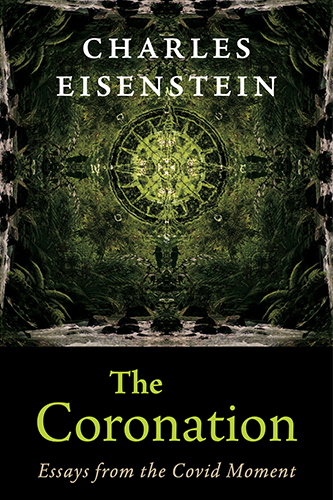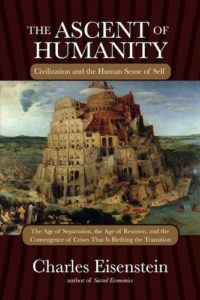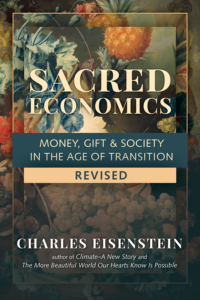Climate — A New Story
Chapters
Chapter 1: A Crisis of Being
A Lost Truth
I still remember the event that made me into an environmentalist. I was seven or eight years old, standing outside with my father watching a large flock of starlings fly past. “That’s a big flock of birds,” I said.
My father told me then about the passenger pigeon, whose flocks once filled the skies, so vast that they stretched from horizon to horizon for hours on end. “They are extinct now,” he told me. “People would just point their guns to the sky and shoot randomly, and the pigeons would fall. Now there aren’t any left.” I’d known about the dinosaurs before then, but that was the first time I really understood the meaning of the word “extinct.”
I cried in my bed that night, and many nights thereafter. That was when I still knew how to cry—a capacity that, once extinguished through the brutality of teenage boyhood in the 1980s, was nearly as hard to resuscitate as it would be to bring the passenger pigeon back to earth.[1]
These two kinds of extinction are related. From what state of being do we extinguish other species, ruin earth and sea, and treat nature as a collection of resources to be allocated for maximum short-term benefit? It can come only from the constriction, numbing, and diversion of our capacity to feel empathy and love. No mere personal failing, this numbing is inseparable from the deep narratives that run our civilization, and the social systems that those narratives support.
Appearances to the contrary, it is neither folly nor myopia that sets us on a path of collective ruin. These are symptoms of a deeper malady. Would you say of the alcoholic that if he were only shown that drinking harms his health, relationships, and economic security, then his dismal future would scare him into quitting? Of course not. The foolish sacrifice of the future for a temporary surcease from the inner pain isn’t driven by stupidity. Therefore, you can harangue him about the damage to his liver all you want, and maybe he’ll say, “Yeah, you’re right,” and cut back for a few weeks, or he will promise to drink less, with every good intention. But nothing will really change. How similar that scenario is to the climate talks. We agree to cut back—and agree, at the same time, to ignore the social and economic conditions that make cutting back impossible. Carbon emissions continue to grow after nearly three decades of climate talks and agreements. This pattern extends beyond the matters of climate. Species continue to perish, bat colonies and bee hives to collapse, forests to wither, coral reefs to bleach, and elephants and whales to die. No one wants to live on a barren planet, a sick planet, or a dying planet, yet like an addict we seem helpless to change course.
Like many clichés, “our addiction to fossil fuels” contains a lost truth. Usually I hear the phrase used in tones of condemnation or disgust (betraying the same lack of empathy that is part of the problem). But if we take the addiction metaphor seriously, we would next inquire as to what drives the addiction.
Some on the left say it is capitalism. Yet the Soviet Union committed grievous environmental damage as well; besides, capitalism (like communism) is itself embedded in more fundamental belief systems that are largely beneath the surface of our awareness. It is these that I intend to excavate in this book, hoping therefrom to derive precepts and strategies for ecological healing. I will describe how many of the efforts to fight climate change or save the environment are based on the same assumptions that drive us toward ruin. I will identify fundamental problems in what I’ll call the Standard Narrative of climate change, and show how the framing of the problem is part of the problem. I will explain how solutions that come from that narrative risk making things worse. The maze thus revealed, I’ll explore the dark passageways and secret doorways that the dominant discourse ignores, but that an alternative Story of the World illuminates.
It is not wrong ideas that drive addiction. Addiction arises in the presence of basic unmet needs. The food addict isn’t really hungry for food; she is hungry for connection. The alcoholic is seeking just to feel okay for a while. The gambler yearns for liberation from economic or psychological confinement. The porn addict’s true desire is for intimacy and acceptance. These (admittedly, trivialized) examples at least convey a general principle: Desire comes from unmet needs. When the true object of the desire is unavailable, the desire is displaced onto the most accessible substitute. What is the unmet need behind the addiction to fossil fuels?
In addiction theory there is a concept of addiction transfer: when the addict is forcibly deprived of the object of her addiction, she will transfer the addiction onto something else. Recipients of bariatric surgery who can no longer overeat might start drinking or gambling instead. Overeating, drinking, and gambling are symptoms of a deeper wound. Similarly, I will argue, the current environmentalist obsession with fossil fuels is also too narrow. Conceivably, we could find another fuel source and maintain the addiction to a system of economics and production that consumes the world.
What is it that we are really looking for in our quest for bigger, faster, and more? Later chapters on energy and agriculture make it clear that humanity’s problems do not stem from any quantitative lack—hunger for instance is nearly always a result of maldistribution. We seek through growth to meet other needs, needs that, because they are fundamentally qualitative, growth can never meet. Basic human desires for connection, community, beauty, sacredness, and intimacy are met with faux substitutes that temporarily numb but ultimately heighten the longing. The trauma of our deprivation drives our collective addictions. Ecological healing therefore requires our society to look beneath its consumptive symptoms and reorient toward qualitative development. To do so requires significant reprogramming, since our guiding narratives, from economic to scientific, embody quantitative thinking.
Ecological deterioration is but one aspect of an initiation ordeal propelling civilization into a new story, a next mythology. By a mythology, I mean the narratives from which we weave our understanding of who we are, what is real, what is possible, why we are here, how change happens, what is important, how to live life, how the world came to be what it is, and what ought to come next. Ecological degradation is an inevitable consequence of the mythology—I call it the Story of Separation—that has dominated the last several centuries (and to an extent the last several millennia). To paraphrase Einstein, it will not be averted from within that mythology.
The essence of the Story of Separation is the separate self in a world of other. Since I am separate from you, your well-being need not affect mine. In fact, cast into an objective external universe, more for you is less for me; naturally then we are in competition with each other. If I can win the competition and dominate you, I’ll be better off and you worse. The same goes for humanity generally vis-à-vis nature. The more control we can exercise over the impersonal forces of nature, the better off we will be. The more intelligence we can impose upon a random, purposeless universe, the better the world will be. Our destiny, then, is to ascend beyond nature’s original limits, to become its lords and masters. The universe, this story says, is but atoms and void, possessing none of the qualities of a self that we experience as human beings: intelligence, purpose, sentience, agency, and consciousness. It is up to us then, to bring these qualities to the dead building blocks of the universe, its generic particles and impersonal forces; to imprint human intelligence onto the inanimate world.
The Story of Separation reverberates through every institution of the modern world. In other books I’ve described how it underlies money, law, medicine, science, technology, education, etc., and how these institutions might evolve under a different story.
This book also aims to describe and, I hope, accelerate the transition to a new (and in many ways ancient) story, with specific reference to climate change and the environmental crisis generally. A shift in mythology is more than a cognitive shift. In this book I will argue that the external changes we face are far more profound than merely switching industrial society to a zero-carbon fuel stock. Every aspect of society, the economy, and the political system must come into alignment with a new story.[2]
The name I like to use for the new story is Thich Nhat Hanh’s term “interbeing.” Although the word has Buddhist overtones, I do not profess to be a Buddhist, nor need the reader embrace Buddhism to appreciate the insights the concept allows.
Interbeing doesn’t go so far as to say, “We’re all one,” but it does release the rigid boundaries of the discrete, separate self to say that existence is relational. Who I am depends on who you are. The world is part of me, just as I am part of it. What happens to the world is in some way happening to me. The state of the cultural climate or political climate affects the condition of the geo-climate. When one thing changes, everything else must change too. The qualities of a self (sentience, agency, purpose, an experience of being) are not confined to humans alone. And the results of our actions will come back to affect ourselves, inescapably.
Interbeing must be more than a philosophical concept if anything is going to change. It must be a way of seeing, a way of being, a strategic principle, and most of all a felt reality. Philosophical arguments alone will not establish it any more than appeals to prudence and reason will solve the ecological crisis.
When we restore the internal ecosystem, the fullness of our capacity to feel and to love, only then will there be hope of restoring the outer. Each level of healing proceeds apace, just as each form of extinction mirrors the rest. That is not to suggest we withdraw from outer activism in favor of inner cultivation. It is that love and empathy are the felt dimensions of the Story of Interbeing, and we cannot act effectively from that story, nor truly serve it, without their guidance. They are the song that will lead us out of the maze. To follow their guidance we must regain our listening capacity, which trauma and ideology have numbed and restricted to a very narrow bandwidth.
Then we will know how to change the systems that reify Separation by severing our ties to community, plants, animals, land, and life and replacing those ties with the technology-mediated, money-mediated, generic relationships of mass society. (Thus bereft, no wonder we always hunger for “more.”)
Love is the expansion of self to include another. In love, your well-being is inseparable from my own. Your pain grieves me and your happiness gives me joy. The ideology of modernity circumscribes the scope of our love by assigning a narrow identity to the self and relegating the nonself to the status of mute, insensate objects or self-interested competitors. To care about others beyond their utility to oneself becomes therefore something of a delusion, like loving your pet brick.[3] Perhaps that is why so much environmental rhetoric comes in the form of warnings that bad things will happen to us if we don’t change our ways. We call arguments “rational” when they appeal to self-interest. This book will argue that rational reasons are not enough; that the ecological crisis is asking for a revolution of love.
For the discrete and separate self in a world of other, love is irrational. Steeped in the logic of separation, the mind is ever in conflict with the heart. Not so, in the logic of interbeing, which recognizes that what happens to the other, to the incarcerated, to the bombed, to the trafficked, to the clear-cut, to the polluted, and to the extinguished is happening, in some sense, to the self as well. In the Story of Interbeing, heart and mind are reunited, and love is what the truth feels like.
If love is truth, then the source of our apparent myopia is clear. It is love benumbed. We do not see that what we devalue and destroy is part of ourselves. We do not see that we aren’t merely conditionally dependent on the oceans, rainforests, and every living system on Earth for survival; that something more important than survival is at stake. It is our humanity. It is our full beingness. Love benumbed, we believe that we can inflict damage without suffering damage ourselves.
Of course, I would not write a book that were just a vague promise that love will save the world. How do we enact it systemically? How do we overcome what blocks it? How do we awaken our benumbed empathy? How do we translate the diagnosis I’ve offered into practical action on the level of politics and ecological healing? These questions are the subject of this book.
End Notes
[1] The reader will notice that I sometimes capitalize “Earth” and sometimes do not. When I refer to it as a planet, I capitalize it. When I refer to it as a realm of habitation, or as a synonym for ground, or in the sense of a place where life happens (any planet like ours would be an earth), I do not.
[2] I use the adjective “new” to mean “new for modern civilization as a guiding narrative.” In fact it is not at all new. Not only did older, indigenous cultures hold some version of the Story of Interbeing, it inhabits Western civilization as well in the form of esoteric teachings, wisdom traditions, and cultural countercurrents. What would be new would be a mass civilization operating according to the principles of interbeing.
[3] Full disclosure: I have a special brick that I use for my qigong practice toward which, I must confess, I feel quite some affection. As for the irrationality of love, I’ll quote a bit of doggerel from the science fiction writer Isaac Asimov. Do you detect as I do a note of abject defeat underneath its know-it-all cheekiness? “Tell me why the stars do shine, Tell me why the ivy twines, Tell me what makes skies so blue, And I’ll tell you why I love you. Nuclear fusion makes stars to shine, Tropisms make the ivy twine, Raleigh scattering make skies so blue, Testicular hormones are why I love you.”






